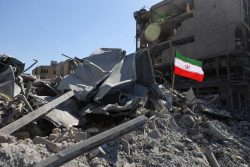14:20 JST, July 12, 2021
The security environment around Japan is becoming even more severe. It is necessary to speed up the strengthening of capabilities regarding effective missile defense.
One year has passed since the government gave up on a plan to introduce the land-based Aegis Ashore missile interception system supplied by a U.S. defense firm.
As an alternative measure, the government plans to build two Aegis-equipped vessels. The Defense Ministry is conducting research and studies on the design of the vessels, with a view to using multihull vessels in which the upper structure is supported by more than one hull to reduce the effects of waves.
It is said the construction of these vessels will take about five years. Military tensions in East Asia are rising, with the danger of a contingency involving Taiwan having been pointed out. It is important to finalize the details of the design at an early stage and accelerate the development of the vessels.
Currently, the nation’s eight Aegis-equipped destroyers are the mainstay of missile defense. However, since they are also tasked with maintaining vigilance and surveillance duty in the area around the Senkaku Islands, there is a heavy burden to keep several of them stationed in the Sea of Japan to respond to possible North Korean missile launches.
If two vessels equipped with the system that was intended for Aegis Ashore are deployed, it will be possible to constantly monitor and intercept missiles throughout Japan. This would ease the burden on the Aegis-equipped destroyers.
In recent years, China and Russia have been developing hypersonic glide vehicles that fly at relatively low altitudes at very high speeds and are difficult to intercept. North Korea has test-fired a new type of missile that travels in an irregular trajectory.
In order to intercept such weapons, the U.S. military is considering a new interception initiative that uses a constellation of satellites. It is important that the vessels to be constructed will be compatible with the initiative.
There are concerns that the cost of introducing the vessels, including maintenance costs, will increase significantly from the initial estimate of about ¥500 billion. Limitless expansion of the costs should not be allowed.
The government must do its utmost to reduce costs and engage in price negotiations with the U.S. side tenaciously.
The Maritime Self-Defense Force is suffering from a crew shortage, so it is urgent to secure personnel. The MSDF should consider utilizing Ground Self-Defense Force personnel who had been preparing for deployment of the land-based Aegis Ashore system as well as retired MSDF members.
At the same time, efforts to steadily increase deterrence should not be neglected. Possessing the ability to counterattack an armed attack will put up more hurdles for an enemy to launch an offensive against Japan. The delay in considering the possession of such a capability may be due to a lack of a sense of crisis in the government.
Formulating a new policy on missile interdiction with an enemy base attack capability in mind has been an issue since previous Prime Minister Shinzo Abe’s administration. Prime Minister Yoshihide Suga should seek the understanding of Komeito, the junior coalition partner that has been taking a cautious stance, and reach a conclusion with the utmost urgency.
— The original Japanese article appeared in The Yomiuri Shimbun on July 11, 2021.
Top Articles in Editorial & Columns
-

Riku-Ryu Pair Wins Gold Medal: Their Strong Bond Leads to Major Comeback Victory
-

Reciprocal Tariffs Ruled Illegal: Judiciary Would Not Tolerate President’s High-Handed Approach
-

China Provoked Takaichi into Risky Move of Dissolving House of Representatives, But It’s a Gamble She Just Might Win
-

Japan’s Plan for Investment in U.S.: Aim for Mutual Development by Ensuring Profitability
-

Flu Cases Surging Again: Infection Can Also Be Prevented by Humidifying Indoor Spaces
JN ACCESS RANKING
-

Producer Behind Pop Group XG Arrested for Cocaine Possession
-

Japan PM Takaichi’s Cabinet Resigns en Masse
-

Man Infected with Measles Reportedly Dined at Restaurant in Tokyo Station
-

Israeli Ambassador to Japan Speaks about Japan’s Role in the Reconstruction of Gaza
-

Videos Plagiarized, Reposted with False Subtitles Claiming ‘Ryukyu Belongs to China’; Anti-China False Information Also Posted in Japan






















